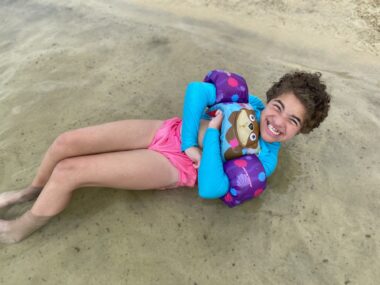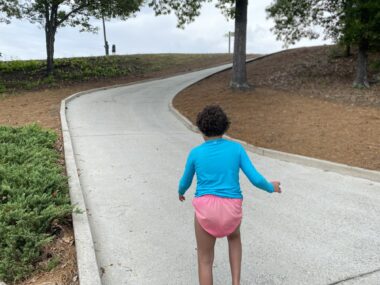My Angel’s small strides are steps in the right direction
Managing different surfaces is one of the life skills we're working on
Written by |

When you’re a caregiver to someone with a neurogenetic disorder like Angelman syndrome, you learn that progress can’t be rushed. It’s a belief I’ve come to embrace while raising my 13-year-old Angel, Juliana. Holding onto this ideal is important as I reflect on her progress with the ramp we built two summers ago to give her access to our patio.
When we first installed the ramp, we could hardly get her to step on it without wailing. Now she eases onto it, and we stand behind her as she takes slow, careful steps. That’s necessary because those affected by Angelman have difficulty walking and balancing. Ataxia, which is an impairment of muscle control and coordination, also plays a part in her abilities.
In addition to these difficulties, Juliana struggles with climbing steps and transitioning to different surfaces. Each time she steps from our driveway to the street, for example, she pauses when she views the varied grading at the curb. She’s cautious, but that also means she’s aware of different surfaces that might cause her to fall.
All of these factors are affecting her mastery of the ramp. Although her progress is slow, she’s still making great strides with her climbing and balancing by tackling other challenges.
Now that’s steep
Last summer, we did a staycation at a lake resort and got more than we bargained for when we headed to the beach. At the time, we didn’t have an accessible-parking pass. Without it, we were denied parking that would’ve help us. We had to drive around the resort to another entrance, which required more walking, stairs, and huge hills. I nearly cried when I saw the path. But I knew Juliana wouldn’t want to miss the beach and water, so the trek was inevitable. I decided to divide and conquer.
I sent my husband and 11-year-old daughter Jessa ahead while Juliana and I slowly braved the stairs and steep declines. It took a while, but she did it. As we managed the final descent, I was thinking about the fuss she’d make coming back up. I decided to put it out of my mind and focus on the upcoming fun.

Worth the work: Juliana enjoys the beach after the long walk, stairs, and hill climbing it took to get there. (Photo by Sabrina L. Johnson)
When it was time to head back, Juliana and I got a head start while Jessa and my husband stayed to enjoy more beach time. We stopped often and took a lot of breaks. I distracted Juliana by singing and pointing to things around us.
Don’t look back
Finally, we reached the biggest incline, and after a few minutes of fussing, Juliana kept going. I praised her beyond belief and had her pose for a few pictures. Once she started climbing, I couldn’t believe how assured she was in her steps, despite the hill’s steepness. I was in awe of Juliana’s strength and willingness to keep going.
At one point, we couldn’t see anything beyond concrete in the spot where we stood, but she was still at ease. I don’t remember how long it took us to get back to the car that day. Wisdom told me not to worry about the time. Eventually we made it back, and that’s all that matters.

Juliana walks up a hill that leads to an even steeper incline. (Photo by Sabrina L. Johnson)
Even with her continued hesitations, I’m still proud of Juliana each time she uses the ramp. If she took on a path that seemed like more of a sports challenge obstacle course, the ramp shouldn’t be too hard to conquer.
One day, she’ll sail down to the patio with confidence and won’t need as much coaxing or support. That day is coming. I can almost see it. It just so happens that it’s not today.
Note: Angelman Syndrome News is strictly a news and information website about the disease. It does not provide medical advice, diagnosis, or treatment. This content is not intended to be a substitute for professional medical advice, diagnosis, or treatment. Always seek the advice of your physician or other qualified health provider with any questions you may have regarding a medical condition. Never disregard professional medical advice or delay in seeking it because of something you have read on this website. The opinions expressed in this column are not those of Angelman Syndrome News or its parent company, Bionews, and are intended to spark discussion about issues pertaining to Angelman syndrome.







Leave a comment
Fill in the required fields to post. Your email address will not be published.